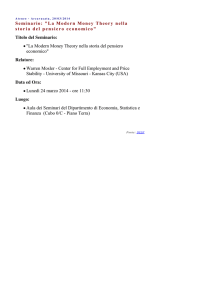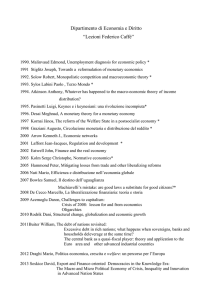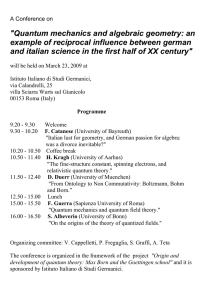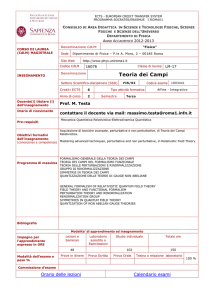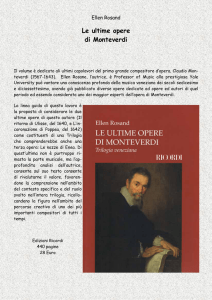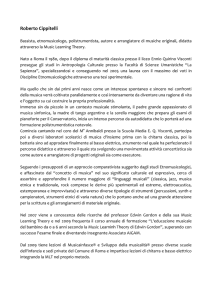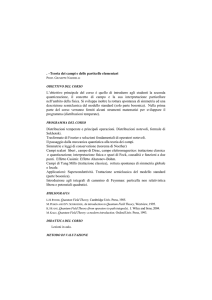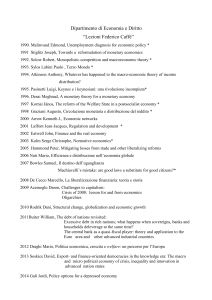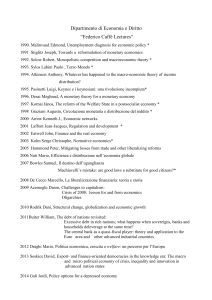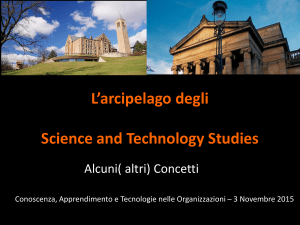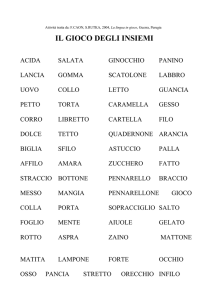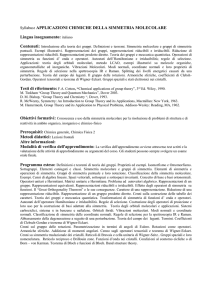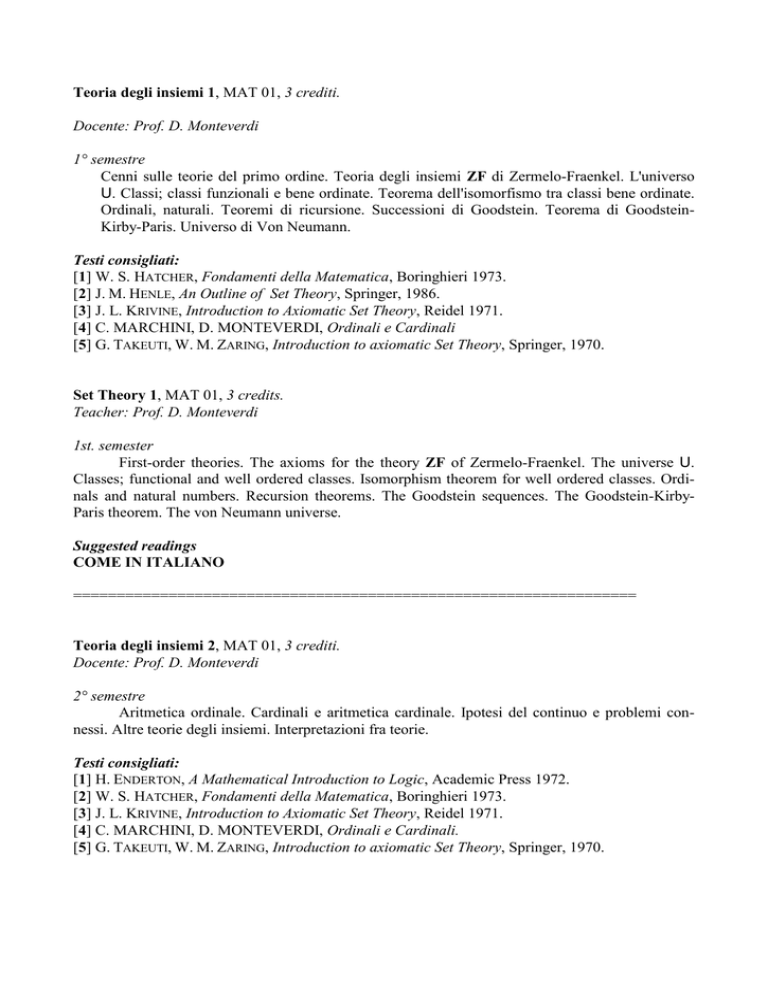
Teoria degli insiemi 1, MAT 01, 3 crediti.
Docente: Prof. D. Monteverdi
1° semestre
Cenni sulle teorie del primo ordine. Teoria degli insiemi ZF di Zermelo-Fraenkel. L'universo
U. Classi; classi funzionali e bene ordinate. Teorema dell'isomorfismo tra classi bene ordinate.
Ordinali, naturali. Teoremi di ricursione. Successioni di Goodstein. Teorema di GoodsteinKirby-Paris. Universo di Von Neumann.
Testi consigliati:
[1] W. S. HATCHER, Fondamenti della Matematica, Boringhieri 1973.
[2] J. M. HENLE, An Outline of Set Theory, Springer, 1986.
[3] J. L. KRIVINE, Introduction to Axiomatic Set Theory, Reidel 1971.
[4] C. MARCHINI, D. MONTEVERDI, Ordinali e Cardinali
[5] G. TAKEUTI, W. M. ZARING, Introduction to axiomatic Set Theory, Springer, 1970.
Set Theory 1, MAT 01, 3 credits.
Teacher: Prof. D. Monteverdi
1st. semester
First-order theories. The axioms for the theory ZF of Zermelo-Fraenkel. The universe U.
Classes; functional and well ordered classes. Isomorphism theorem for well ordered classes. Ordinals and natural numbers. Recursion theorems. The Goodstein sequences. The Goodstein-KirbyParis theorem. The von Neumann universe.
Suggested readings
COME IN ITALIANO
=================================================================
Teoria degli insiemi 2, MAT 01, 3 crediti.
Docente: Prof. D. Monteverdi
2° semestre
Aritmetica ordinale. Cardinali e aritmetica cardinale. Ipotesi del continuo e problemi connessi. Altre teorie degli insiemi. Interpretazioni fra teorie.
Testi consigliati:
[1] H. ENDERTON, A Mathematical Introduction to Logic, Academic Press 1972.
[2] W. S. HATCHER, Fondamenti della Matematica, Boringhieri 1973.
[3] J. L. KRIVINE, Introduction to Axiomatic Set Theory, Reidel 1971.
[4] C. MARCHINI, D. MONTEVERDI, Ordinali e Cardinali.
[5] G. TAKEUTI, W. M. ZARING, Introduction to axiomatic Set Theory, Springer, 1970.
Set Theory 2, MAT 01, 3 credits.
Teacher: Prof. D. Monteverdi
2nd. semester
Ordinal arithmetic. Cardinals and cardinal arithmetic. Continuum Hypothesis. Interpretations
of one set theory into another.
Suggested readings
COME IN ITALIANO
=================================================================
Istituzioni di Logica Matematica, MAT 01, 6 crediti.
Docente: Prof. M. Servi
Collaboratore didattico: Prof. C. Reggiani
2° semestre
Programma da concordare con gli studenti, scegliendo dai seguenti temi:
1)
Teorie (Estensioni e teorie equivalenti; estensioni conservative, definitorie e linguistiche.
Teorie con classi).
2)
Il problema dei fondamenti (Il Logicismo di Frege e antinomie. Tipi di Russell. Intuizionismo. Opportunità di assiomatizzare gli insiemi).
3)
Algebra universale (Strutture algebriche, insiemi di generatori, algebre libere. Prodotti
diretti, congruenze e quozienti. Classi equazionali, teorema di Birkhoff).
4)
Elementi di teoria delle Categorie (Lemma di Yoneda. Una fondazione insiemistica: MMU.
Funtori aggiunti. Problemi universali).
5)
Logica algebrica e categoriale.
6)
Linguaggi di ordine superiore e linguaggi multisorte.
Testi consigliati:
[1] S. BURRIS, H. P. SANKAPPANAVAR: A course in Universal Algebra, Springer 1981.
[2] W. S. HATCHER, Fondamenti della Matematica, Boringhieri 1973.
[3] S. MAC LANE, Categorie nella pratica matematica, Boringhieri 1977.
[4] M. MAKKAI, G. REYES, First order categorical logic. Model-theoretical methods in the theory of
topoi and related categories, Lecture Notes in Mathematics, Vol. 611, Springer-Verlag, Berlin-New
York, 1977.
[5] B. MITCHELL, Theory of Categories, Academic Press 1965.
[6] B. MITCHELL, Introduction Category Theory and Homological Algebra, III cilco C.I.M.E. 1971,
Edizioni Cremonese 1973.
[7] H. RASIOWA, R. SIKORSKI: The Mathematics of Metamathematics, Warsaw 1970.
[8] M. SERVI, L'ABC delle categorie in cinque lezioni, Rapporto Matematico n. 258, Dipartimento
di Matematica dell'Università di Siena, 1993.
Istituzioni di Logica Mathematica, MAT 01, 6 credits.
Main lecturer: Prof. M. S. Servi
Assistant lecturer: Prof. C. Reggiani
nd
2 semester
Some topics from the following list:
1) First order Theories (extensions of a theory, equivalent theories, conservative, definitory and
linguistic extensions. Theories with classes).
2) Foundations (Frege and Logicism, antinomies. Russell, Type Theory. Intuitionism. Axiomatic
Set theories)
3) Universal Algebra (Algebraic structures, sets of generators, free algebras. Direct products,
congruences, quotients. Equational classes, Birkhoff’s theorem).
4) An introduction to Category Theory (Yoneda’s Lemma. A set theoretical foundation: MMU.
Adjoint functors. Universal problems).
5) Algebraic and Categorical Logic.
6) Higher order languages and multisort languages.
Suggested readings
COME IN ITALIANO

